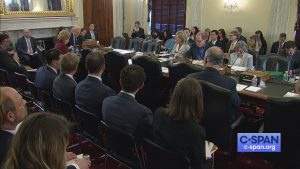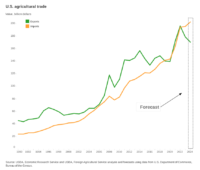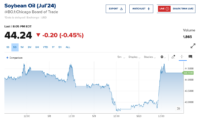Bloomberg's Clarice Couto reported this past Friday that "a surprising tax change in agriculture powerhouse Brazil has the potential to make soy grown in the world’s largest bean exporter less…
Senate Agriculture Committee Trade Hearing- USMCA, China, and MFP Payments
On Thursday, the Senate Agriculture Committee held a hearing titled, “Certainty in Global Markets for the U.S. Agriculture Sector.” Lawmakers discussed the USMCA, the ongoing trade negotiations with China, and sought additional details on the Administration’s second round of trade mitigation payments for farmers, which was announced last month. Recall that a House Agriculture Subcommittee held a trade related hearing on Tuesday.
Hearing: Background
In his opening remarks, Committee Chairman Pat Roberts (R., Kans.) pointed out that, “[T]his is the second time in the last year that we are hearing about the efforts being made at the Office of the United States Trade Representative and the Department of Agriculture (summary of previous hearing available here). Efforts that I hope eventually will result in long-term, reliable markets for United States agriculture.”
Everyone around this table understands what our producers are facing back home. On top of already low prices for their crops, producers are working through floods, tornados, and weather events too numerous to list, and of course, challenges of retaliatory tariffs.
“Fortunately, the Farm Bill is in place to ease some of the uncertainty felt in farm country. However, I continue to be very concerned about the overall impacts on U.S. agriculture as a result of the use of tariffs as a policy tool.”

Committee Ranking Member Debbie Stabenow (D., Mich.) indicated that, “Exactly one year ago, we sat around this table and passed our bipartisan Senate Farm Bill out of committee in order to provide certainty and predictability to our farmers and ranchers. Today, however, that certainty is being undermined by this Administration’s chaotic and unpredictable trade agenda.”
“Facing great unknowns has always been part of life for farmers and ranchers. However, right now we are in uncharted territory.”
With respect to trade aid, Sen. Stabenow stated that, “The USDA recently decided to announce a second round of trade assistance that if anything, is adding to the confusion and uncertainty for farmers. While I understand the desire to help farmers weather the Administration’s chaotic trade agenda, the proposed aid is creating more questions than answers.
I have strong concerns that these payments won’t be distributed in an equitable way between regions and crops. The timing of the announcement – combined with widespread prevented planting decisions –could make our farm economy even worse.
“Additionally, the Administration’s actions are certainly an unprecedented use of Commodity Credit Corporation funds, which are not guaranteed. That raises some questions for Congress.”
Stabenow: “A short-term trade disruption can create a permanent loss in market share for American farmers. That happened during the Nixon Administration’s ban on soybean exports.”
— Senate Ag Democrats (@SenateAgDems) June 13, 2019
How long will it take to rebuild the market for U.S. soybeans? #AgTrade pic.twitter.com/jgqcKduTtn
Ambassador Gregory F. Doud, from the U.S. Trade Representative’s Office, explained on Thursday that, “The President has a robust trade agenda that includes many potential economic opportunities for farmers, ranchers, workers, and agribusinesses, including negotiations for trade agreements with Japan, the European Union, and the United Kingdom upon its exit from the European Union. To advance the rest of the trade agenda, however, passage of USMCA is critical.”
At @SenateAgGOP, @SenateAgDems hearing: @USDA Under Secretary for Trade and Foreign Agricultural Affairs Ted McKinney-
— Farm Policy (@FarmPolicy) June 13, 2019
"The #USMCA is a top legislative priority of the Administration just as it is a top priority of much of U.S. #agriculture." pic.twitter.com/1CVCYQVEpL
And Ted McKinney, the USDA Under Secretary for Trade and Foreign Agricultural Affairs, pointed out in his opening remarks that, “The USMCA is a top legislative priority of the Administration just as it is a top priority of much of U.S. agriculture.”
Hearing: Discussion
During the discussion portion of Thursday’s hearing, in response to a question from Chairman Roberts, Ambassador Doud highlighted trade issues with China and noted that, “Mr. Chairman, we have spent hours and hours and hours with China. It has truly been…my counterpart has said, on many occasions—and [USDA Under Secretary Ted McKinney] has been there—a historic discussion. The way I’ve had that conversation with them is that last year you imported $124 billion in agricultural products. That compares to our 145. China’s total imports are 124. And in a good year we’ve only done 20 of that. And I have made the point repeatedly that 20 out of 124, given our capacity to export agricultural products around the world, just isn’t going to get it done.
“I mean, you look down the list here, we haven’t sold them a pound of poultry since 2015. We were blocked in beef since 2003. They’re importing now well over a billion dollars a month in beef, pork and poultry. In the month of April our share of that was $36 million. And that isn’t retaliatory tariffs. That’s we just don’t have access because of these structural and non-tariff trade barriers. These are the things that we’ve been talking about.”
At @SenateAgGOP, @SenateAgDems #trade hearing: @USTradeRep Ambassador Gregory F. Doud: To advance the rest of the trade agenda, however, passage of #USMCA is critical. pic.twitter.com/OgyytUg12m
— Farm Policy (@FarmPolicy) June 13, 2019
Chairman Roberts noted that, “From 2017 to 2018 the value of ag exports from the U.S. to China decreased despite all your efforts, 53%, from 19.5 billion to 9.2 billion. For nearly a decade China has consistently ranked either first or second in export destination for our ag products. However, in 2018 they fell to fourth…what is the future strategy to ensure that the U.S. is able to regain the market share that has been lost as a result of the current trade situation?”
“Senator, the answer to that is we have to fix these structural issues,” Amb. Doud said; adding that, “We also have to diversify our portfolio.”
Chairman Roberts pointed out that,
I know it may take a few years. What we worry about is 2019 has been tough. 2020 looks like it’s going to be tough. I don’t know how long this goes on. It’d be seven years with low prices. And I understand that the previous bar there, you know, we had high prices. But some farmers aren’t going to make it. That’s just the…that’s the rub of it.
Sen. Stabenow focused much of her attention on the MFP program.
Speaking to USDA Chief Economist Rob Johansson, she queried: “I’d like to start, Dr. Johansson, we’ll give you a moment to speak here. I want to ask you a question regarding the second round of trade payments, because I’m very concerned that they’re not going to be fair or equitable to producers. It seems like there could be wide disparities between counties, so even farmers in neighboring counties that grow the same crop could receive wildly different levels of support.
“It also seems that a farm that experienced flooding would be disadvantaged relative to a neighbor who was able to plant, since the program requires a crop to be planted. Most of all I’m concerned about the disparity between crops. You are no longer making payments based just on retaliatory tariffs. So can you clarify what specific problem USDA is trying to solve? Is it mitigation of trade damage, low prices, or both?”
Dr. Johansson explained that, “Regarding the second round of market facilitation program payments, I think we did put out a press release a couple days ago that did answer some of those questions. And of course the rule is over at the Office of Management and Budget right now as part of the interagency process, so I am somewhat limited in how much details I can go in.”
Dr. Johansson added that, “And so we’ve been very clear that the program is agnostic to the crop planted for the row crop component of the program, such that producers wouldn’t expect to receive, for example, last year’s program payment for soybeans was larger than the other row crop payments, and so if a producer thought that this year they might be incentivized to plant for soybeans, expecting to get a larger payment. And we certainly didn’t want that to occur, particularly when we’re sitting on record levels of soybean stocks right now in the countryside.
“So we wanted to make the program, again, not market distorting, to the extent that we could. And that’s why we’ve developed a county level approach for providing payments. A producer in a county can receive the county rate multiplied by the acres planted of any of the eligible crops that are listed under the market facilitation program portion of the row crop payment system.”
Sen. Stabenow indicated that, “And as far as I’m concerned when we look at—listening to you talk about despite best efforts not to distort the marketplace.
I mean, we passed a farm bill based on a thoughtful commodity title, based on risk management, laying things out, and now it seems to me the whole thing’s being thrown up in the air by payments that have nothing to do with what we put together in a five year farm bill. And it’s not just one year, it’s now going on for a second round of payments.
Also Thursday, Sen. John Thune (R., S.D.) asked, “On the MFP program and the June 10 USDA press release provided, and I quote, ‘If you choose to plant a cover crop with potential to be harvested because of this year’s adverse weather conditions, you may qualify for a minimal amount of 2019 MFP assistance. You must still comply with your crop insurance requirements to remain eligible for any indemnities received,’ and that’s end quote.
And I guess the question is if you’re eligible for a minimal amount of MFP assistance, why wouldn’t USDA make a more equitable MFP payment to producers comparable to the MFP payment that would be paid if that producer had been able to plant and harvest a crop? Dr. Johansson.
While USDA doesn’t have authority over Mother Nature, it can help mitigate some of the pain that’s being felt in the agriculture community in the state and around the country, and I hope it acts quickly. Glad I could express the concerns of South Dakota farmers to @USDA today. pic.twitter.com/xlh3GJ3Z7c
— Senator John Thune (@SenJohnThune) June 13, 2019
Dr. Johansson noted that, “So as I mentioned earlier, we’re trying to balance trying not to incentivize market distortionary decisions, and we want farmers to plant for their operation, for their…what works best for them given the current prices we’re seeing out there as well as the current agronomic conditions that they’re seeing on their operation…And so, you know, as with last year, you know, we’re viewing the current situation with respect to prevent plant as something that by and large should be covered by the prevent plant conditions that are part of their normal crop insurance contract. And that while, if producers do plant an eligible cover crop, they will receive a component of their…of the MFP payment for that planting. By and large their incentive payment will be coming from…their recovery payment or their safety net will be coming from the prevent plant, not from MFP.
“The market facilitation program’s obviously designed to address trade issues and not designed to address weather issues. But again, as I pointed out earlier, there is also the disaster bill that we’re looking at, the supplemental disaster that also calls up prevent plant. And so again that’s another balancing act that we’re undergoing right now in the Department.”
Following are some additional tweets from Thursday’s hearing:
During a @SenateAgGOP hearing, I questioned Administration officials on the USMCA’s improvements to address non-tariff barriers to agriculture products and technical trade rules, and how they will translate to real benefits for Iowa’s farmers and manufacturers. WATCH: pic.twitter.com/I7kDut4b8m
— Joni Ernst (@SenJoniErnst) June 13, 2019
At @SenateAgGOP hearing, @SenJoniErnst highlights #AfricanSwineFever issue in #China and notes that ongoing #TradeWar is hurting #export opportunities for #Iowa #hog #farmers. pic.twitter.com/BqWyfhbV2A
— Farm Policy (@FarmPolicy) June 13, 2019
At @SenateAgGOP #trade hearing, @amyklobuchar also brings up #China #AfricanSwineFever issue and lost #export opportunities for #Minnesota swine producers pic.twitter.com/y3mykY7Ncc
— Farm Policy (@FarmPolicy) June 13, 2019







